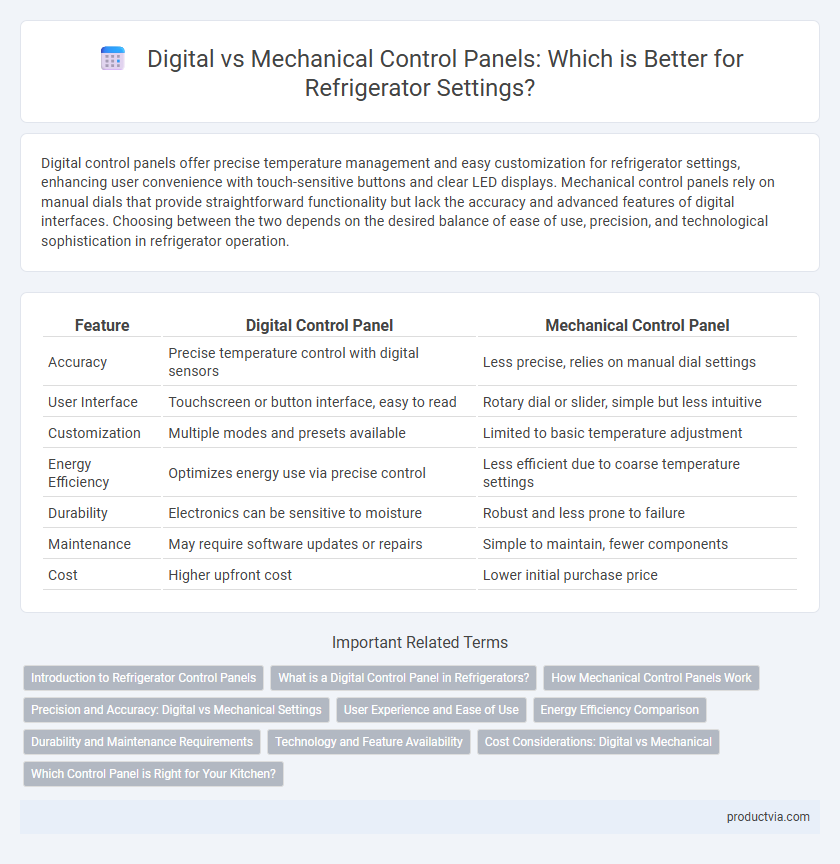Digital control panels offer precise temperature management and easy customization for refrigerator settings, enhancing user convenience with touch-sensitive buttons and clear LED displays. Mechanical control panels rely on manual dials that provide straightforward functionality but lack the accuracy and advanced features of digital interfaces. Choosing between the two depends on the desired balance of ease of use, precision, and technological sophistication in refrigerator operation.
Table of Comparison
| Feature | Digital Control Panel | Mechanical Control Panel |
|---|---|---|
| Accuracy | Precise temperature control with digital sensors | Less precise, relies on manual dial settings |
| User Interface | Touchscreen or button interface, easy to read | Rotary dial or slider, simple but less intuitive |
| Customization | Multiple modes and presets available | Limited to basic temperature adjustment |
| Energy Efficiency | Optimizes energy use via precise control | Less efficient due to coarse temperature settings |
| Durability | Electronics can be sensitive to moisture | Robust and less prone to failure |
| Maintenance | May require software updates or repairs | Simple to maintain, fewer components |
| Cost | Higher upfront cost | Lower initial purchase price |
Introduction to Refrigerator Control Panels
Digital control panels on refrigerators offer precise temperature adjustments, programmable settings, and energy-efficient features, enhancing user convenience and appliance performance. Mechanical control panels rely on dial or slider mechanisms, providing straightforward and reliable temperature control with minimal maintenance requirements. Choosing between digital and mechanical control panels depends on user preference for advanced functionality versus simplicity and durability.
What is a Digital Control Panel in Refrigerators?
A digital control panel in refrigerators is an electronic interface that allows users to set and monitor temperature and other functions with precision using touch-sensitive buttons or a touchscreen. It provides real-time feedback, energy-saving options, and customizable modes such as frost-free operation or quick cooling. Compared to mechanical control panels, digital controls offer enhanced accuracy, easier adjustments, and integration with smart home systems for remote monitoring.
How Mechanical Control Panels Work
Mechanical control panels in refrigerators operate through a system of dials, knobs, and switches connected to internal temperature-sensing components like thermostats. These panels adjust cooling levels by physically regulating the flow of electricity to the compressor and fans, providing straightforward, tactile control over temperature settings. Mechanical controls are durable and reliable, often favored for their simplicity and ease of repair, but lack the precision and customization offered by digital counterparts.
Precision and Accuracy: Digital vs Mechanical Settings
Digital control panels in refrigerators offer superior precision and accuracy for temperature settings through microprocessor regulation and real-time sensors, ensuring consistent cooling conditions. Mechanical control panels rely on user adjustments via dials or knobs, which can lead to less exact temperature control and fluctuations due to manual calibration limitations. The enhanced accuracy of digital panels contributes to better food preservation and energy efficiency compared to mechanical counterparts.
User Experience and Ease of Use
Digital control panels offer precise temperature adjustments and intuitive touch interfaces, enhancing user experience with customizable settings and clear display feedback. Mechanical control panels rely on manual dials and switches, which can be less precise and harder to read but provide straightforward operation without digital complexity. Users seeking seamless control and modern convenience typically prefer digital panels, while those valuing simplicity often favor mechanical controls.
Energy Efficiency Comparison
Digital control panels in refrigerators offer precise temperature management, enhancing energy efficiency by minimizing fluctuations and reducing compressor workload. Mechanical control panels rely on manual adjustments, which can lead to inconsistent settings and higher energy consumption. Studies show that refrigerators with digital controls can lower energy usage by up to 10% compared to mechanical controls, optimizing overall efficiency.
Durability and Maintenance Requirements
Digital control panels for refrigerators offer precise temperature management and advanced features but may require more frequent software updates and exhibit higher sensitivity to moisture and electrical issues, leading to potentially increased maintenance. Mechanical control panels feature robust durability with simpler components, minimizing the risk of failure and often requiring less specialized maintenance, making them reliable in harsher environments. Choosing between digital and mechanical controls depends on balancing the need for advanced functionality against long-term durability and ease of maintenance.
Technology and Feature Availability
Digital control panels in refrigerators offer advanced features such as precise temperature adjustments, touch-sensitive interfaces, and customizable settings, enhancing user convenience and energy efficiency. Mechanical control panels rely on manual dials or sliders, providing basic temperature control without digital feedback or advanced modes. The integration of smart technology in digital panels supports connectivity options like Wi-Fi and app control, which are absent in traditional mechanical systems.
Cost Considerations: Digital vs Mechanical
Digital control panels for refrigerators often entail higher initial costs due to advanced technology and touch-sensitive interfaces, increasing manufacturing and repair expenses. Mechanical control panels typically offer a more budget-friendly option, utilizing simple knobs and dials that reduce both purchase price and maintenance costs. Cost-conscious consumers prioritize mechanical controls for affordability, while digital panels appeal to those willing to invest in enhanced functionality and aesthetics.
Which Control Panel is Right for Your Kitchen?
Digital control panels offer precise temperature settings, energy efficiency, and easy-to-read displays, making them ideal for tech-savvy users seeking modern convenience. Mechanical control panels provide straightforward, reliable operation with fewer components that may require less maintenance, perfect for those preferring simplicity and durability. Choosing the right control panel depends on your kitchen lifestyle, desired features, and ease of use preferences.
Digital control panel vs Mechanical control panel for refrigerator settings Infographic

 productvia.com
productvia.com